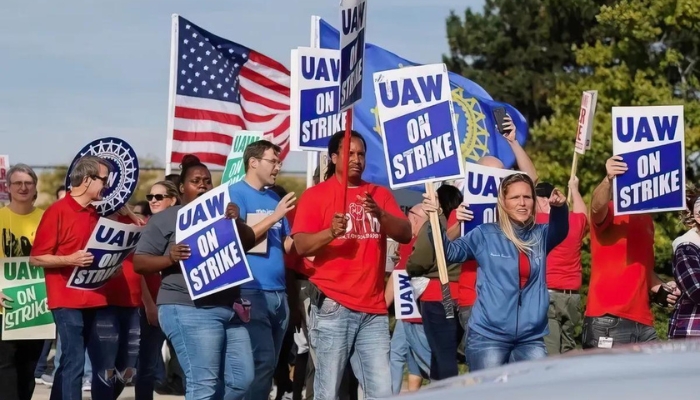Automakers’ Union Contracts Deadline
Anúncios
Time is running out to avert a strike that could shut down America’s unionized automakers assembly plants and other manufacturing facilities.
The United Auto Workers contracts expire at 11:59 pm Thursday. The contracts cover 145,000 UAW members at the three companies: General Motors, Ford, and Stellantis, which builds vehicles under the Jeep, Ram, Dodge, and Chrysler brands for North America.
If there’s no new deal by the contract expiration, the union has said it will start targeted strikes against an undisclosed number of facilities at each company.
Which plants would go on strike?
It might not take much to virtually shut down the output from all the companies.
The companies operate a complex network of plants that depend on getting parts from different facilities. Slowing or stopping the production of a few engine or transmission plants at each company could be as effective at stopping operations as a full strike at all plants, according to industry experts.

One engine or transmission location per company might be enough to shut down nearly three-quarters of the US assembly plants, said Jeff Schuster, global head of automotive for GlobalData, an industry consultant.
“Halting the companies’ assembly lines would likely happen in less than a week that way,” Schuster said.
One advantage of a targeted strike for the union is the potential to save resources and extend a possible walkout. Striking union members are eligible for $500 a week from the union’s strike fund. If all 145,000 UAW members among the three automakers were to strike at the same time, it could cost the fund more than $70 million a week, draining the $825 million fund. With targeted strikes, it’s possible that the companies will shut down operations and lay off members who are not technically on strike. That could make them eligible to receive state unemployment benefits rather than strike benefits, which could preserve the union’s resources.
Will the automakers continue to budge?
Ford and GM are now offering a 20% raise during the life of the contract, and Stellantis is offering 17.5%. The union started with a demand for an immediate 20%, and four additional raises of 5% each over the course of a four-year deal.
And all the automakers issued statements saying they want to reach tentative labor deals before the deadline that would avoid a strike. Despite the difference, there is a chance for an 11th-hour settlement or settlements.
Will deals be reached with one or more automakers?
There are separate union contracts at each of the traditional Big Three. That means there could be a tentative labor deal reached at Ford and GM that keeps those workers on the job, while the employees at Stellantis could go out on strike.
Ford has not had a national strike since 1976 and has not had a strike of any kind at its US plants since 1978.
In contrast, experts say Stellantis, which builds vehicles under the Jeep, Ram, Dodge, and Chrysler brands, could see workers walk off.
“I think there’s a 99% chance of a strike at Stellantis,” said Art Wheaton, director of labor studies at Cornell University’s Industrial and Labor Relations school in Buffalo.
Stellantis is making greater use of lower-paid temporary workers than the other automakers. Eliminating or at least limiting use of temporary workers is a major issue for the union.
Will the contract deadline be extended?
If the two sides are close to a deal at the deadline, they could agree to a temporary contract extension for hours or even days. That extension could even go on for months, as with the West Coast ports during negotiations with the International Longshore and Warehouse Union last year and earlier this year.
Will talks break down at one or more automakers?
Sometimes one or both sides will walk away before the final minute before a contract expiration. Although the strike might not start until after the deadline, a breakdown of talks could kill the chance for an 11th-hour deal.
That’s what happened in bargaining in May between the Writers Guild of America, which represents 11,000 writers, and the Alliance of Motion Picture and Television Producers, which represents major studios and streaming services in the contract negotiations. While the contract was due to end at midnight PDT, the talks ended about three hours earlier.
But a break in talks at any of the automakers at this late date would not be a good sign.
See also: Rising CPI






